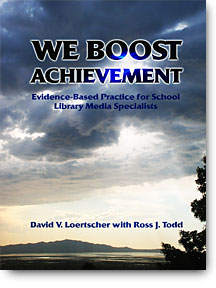Evidence-Based Practice and School Improvement
This theme focuses on how learning outcomes and learning processes through the school library can be identified, measured and documented. It seeks to develop both theoretical and professional perspectives which cover a wide spectrum, including research methodologies, methods and tools for measuring professional evidence, as well as examining the integration of evidence into professional practice for continuous improvement.
Evidence-Based Practice – Articles
Todd, R. J. (2009) School Librarianship and Evidence-Based Practice: Perspectives, Progress and Problems. Evidence Based Library and Information Practice. Available at: http://ejournals.library.ualberta.ca/index.php/EBLIP/article/view/4637/5318.
Abstract:
This paper provides an overview of progress and developments surrounding evidence based practice in school librarianship, and seeks to provide a picture of current thinking about evidence based practice as it relates to the field. It addresses current issues and challenges facing the adoption of evidence based practice in school librarianship. It is based on a narrative review of a small but growing body of literature on evidence based practice in school librarianship, set within a broader perspective of evidence based education.
Evidence-Based Practice – Books

Loertscher, D.V. with Todd, R.J. (2003). We boost achievement! Evidence-based practice for school library media specialists. Salt Lake City, UT: Hi Willow Research & Publishing. Available at: http://www.lmcsource.com
Want to collect the evidence that you boost the achievement in your school with your LMC program? This book provides a multitude of techniques to collect evidence concerning reading, information literacy, collaborative planning, and technology. And like throwing pebbles in a pool causing a ripple effect, these measures not only document what you are doing, but suggest changes in your program to maximize your impact. The various measures in the book follow what is titled the triangulation of data. That is, if one were to measure impact on reading, data would be collected at the learner level, the teaching unit level, and the organization level. Both direct and indirect measures would be created. Because no thermometer can be stuck in a reader’s mouth to see whether there is a 98 degree ‘capable and avid reader,’ the variety of measures taken approximate the ‘duck test’ (if it walks like a duck, quacks like a duck… it must be a duck). An essential guide in times when achievement is the bottom line!
